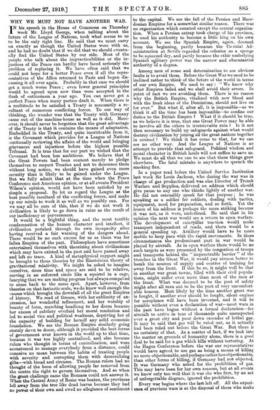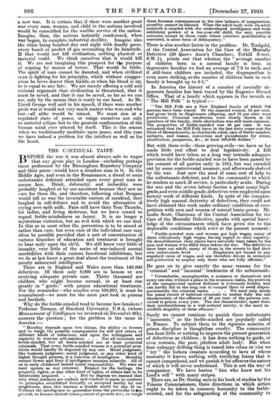WHY WE MUST NOT HAVE ANOTHER WAR.
1 his speech in the House of Commons on Thursday I week Mr. Lloyd George, when talking about the future of the League of Nations, took what seems to us to be the only right line. He said that we must carry on exactly as though the United States were with us, and he had no doubt that if we did that we should eventu- ally find the United States by our side. Most of the people who talk about the impracticabilities or the in- justices of the Peace can hardly have faced seriously the problem of replacing it. We have often said that we could not hope for a better Peace even if all the repre- sentatives of the Allies returned to Paris and began dis- cussing it all over again. Probably in that case we should get a much worse Peace ; even fewer general principles would be agreed upon now than were accepted in the flush of enthusiasm a year ago. You can never get a perfect Peace when many parties draft it. When there is a multitude to be satisfied a Treaty is necessarily a re- sultant of numerous conflicting forces. To our way of thinking, the wonder was that the Treaty with Germany came out of the machine-house as well as it did. More- over, it should never be forgotten that the great advantage of the Treaty is that it contains the means of adaptation. Embedded in the Treaty, and quite inextricable from it, is the Covenant, which provides for a League of Nations continually reviewing the affairs of the world and bringing grievances and injustices before the highest possible Tribunal. It is true that for our part we wished that the Covenant had been less ambitious. We believe that if the Great Powers had been content merely to pledge themselves to respect Treaties and not to denounce them without long notice, we should have gained even more security than is likely to be gained under the League. But we fully admit that at the time when the Peace Conference met American opinion, or at all events President Wilson's opinion, would not have been satisfied by so simple a proposal. So let us regard the League as the best possible resultant of the conflicting forces, and make up our minds to work it as well as we possibly can. For we may all be sure of this, that if we do not work it civilization is likely to go down in ruins as the result of our inefficiency or perverseness. It would be a frightful thing, and the most terrible condemnation of the human character and intellect, if civilization perished through its own incapacity after having received a fair warning of the dangers ahead. There would be no such excuse for us as there was for fallen Empires of the past. Philosophers have sometimes entertained themselves with theorizing about civilizations which may have existed in the past and have passed away and left no trace. A kind of metaphysical support might be brought to those theories by the Einsteinian theory of gravitational relativity. We might be asked to imagine ourselves, since time and space are said to be relative, moving in an enforced circle like a squirrel in a cage, fancying that we are making progress but always compelled to come back to the same spot. Apart, however, from theories on. that fantastic scale, we do know well enough the causes which brought the downfall of all the great Empires of history. We read of Greece, with her sublimity of ex- pression, her wonderful refinement, and her worship of beauty of form, marching, headlong to her doom because her excess of subtlety overlaid her moral resolution and led to social vice and political weakness, depriving her of the capacity of building for herself any solid economic foundation. We see the Roman Empire similarly going sternly down to doom, although it provided the best forms of government ever known in the world up to that time, because it was too highly centralized, and also because rulers who thought in terms of centralization, and were accustomed to manage everybody from a distance, could conceive no mean between the habits of treating people with severity and corrupting them with demoralizing gifts—with bread and circuses. The Roman rulers had no thought of the boon of allowing people far removed from the centre the right to govern themselves. And so when the seat challenge came the Romans could not answer it. When the Central Army of Rome was beaten, the provinces fell away from the tree like dead leaves because they had no power of their own and owed no allegiance of sentiment to the capital. We see the fall of the Persian and Mace- donian Empires for a somewhat similar reason. There was no organization which counted except the central organiza- tion. When a Persian satrap took charge of his province, he used his authority to become a little king on his own account. We see the Spanish Empire, again, doomed from the beginning, partly because the Co:onial Ad- ministration at Seville regarded the colonies as a sponge to be squeezed dry, and partly because the ethic underlying Spanish military power was the narrow and obscurantist authority of a dogma.
Among men of sense and determination to see obvious faults is to avoid them. Before the Great War we used to be inclined rather to think of the future of the world in terms of our own Empire. We used to say : " We know why other Empires failed and we shall avoid their errors. In point of fact we are avoiding them. There is no reason why the British Empire, vitalised with new blood and with the fresh ideas of the Dominions, should not live on for ever." But what if, after all, it is impossible—as we think it all the time has been impossible—to confine our duties to the British Empire ? What if it should be true, as we believe it is true, that one Great Power may be able to involve all the others in irretrievable ruin ? Is it not then necessary to build up safeguards against what would destroy civilization by joining all the great nations together in counsel ? We think it has come to that, for we can see no other way. And the League of Nations is an attempt to provide that safeguard. Political wisdom and moral character in British lands will not suffice to save. us. We must do all that we can to see that these things grow elsewhere. The fatal mistake is anywhere to quench the smoking flax.
In a paper read before the United Service Institution last week Sir Louis Jackson, who during the war was in charge of gas production. and was also Director of Trench Warfare and Supplies, delivered an address which should give pause to any one who thinks lightly of another war. He did not ostensibly speak for that purpose ; he was speaking as a soldier for soldiers, dealing with tactics, equipment, need for preparation, and 80 forth. Yet the lesson of his address is perhaps the more striking because it was not, as it were, underlined. He said that in his opinion the next war would see a return to open warfare. The development of caterpillar traction would make transport independent of roads, and there would be a general speeding up. Artillery would have to be more mobile to keep pace with the rapid movements. In these circumstances the predominant part in war would be played by aircraft. As in open warfare there would be no such targets as were presented by the congestion of troops and transports behind the " impenetrable barrier " of the trenches in the Great War, it would pay airmen better to bomb the sources of supply and centres of training far away from the front. If this be so, it might well be that in another war great towns, filled with their civil popula- tions, might suffer even more than most of the men at the front. What was deemed to be the post of safety might after all turn out to be the post of very uncomfort- able honour. Most likely by the time another great war is fought, if another ever should be fought, silent engines for aeroplanes will have been invented, and it will be possible without even a declaration of war—most wars in the past have begun without a formal declaration—for aircraft to arrive in tens of thousands quite unsuspected over a great city and pour down cascades of lethal gas. It may be said that gas will be ruled out, as it actually had been ruled out before the Great War. But there is no certainty of that. As a matter of fact, if we look into the matter on grounds of humanity alone, there is a good deal to be said for a gas which kills without torturing. At the Hague Conference before the war our representatives would have agreed to use gas as being a means of killing no more objectionable, and perhaps rather less objectionable, than other forms of killing, if Germany had not objected., It was Germany who asked for the prohibition of gas. This may have been for her own reasons, but at all events we know only too well that it was she who first, by an act of unforgettable disgrace, ignored the prohibition.
Every war begins where the last left off. All the experi- ence of previous wars is at the disposal of those who make a new war. It is certain that if there were another great war every man, woman, and child in the nations involved would be conscribed for the warlike service of the nation. Imagine, then, the nations instantly condemned, when war began, to complete industrial sterility. Imagine also the cities being bombed day and night with deadly gases, every bomb or packet of gas accounting for its hundreds. If that would not kill civilization, nothing physical or material could. We think ourselves that it would krill it. We are not imagining this prospect for the purpose of arguing by means of terror. That would be futile. The spirit of man cannot be daunted, and when civilized man is fighting for his principles, which without exagger- ation he loves dearer than his life, or when his blood is up, he is equal to any fate. We are merely offering a cold and rational argument that civilization is threatened, that it must be saved, and that it can be saved, so far as we can see, only by the means that is ready to our hand. As Mr. Lloyd George well said in his speech, if there were another great war it would not very much matter who won and who lost—all alike would be ruined. We must aim at a regulated state of peace, or resign ourselves not only to material eclipse but to the greatest condemnation of the human mind ever uttered by itself. This is the season when we traditionally meditate upon peace, and this year we have indeed a problem for the intellect as well as for the heart.



























 Previous page
Previous page